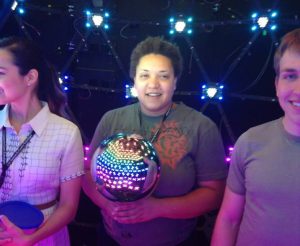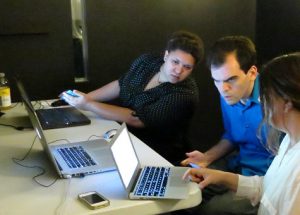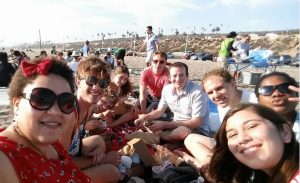Carla Gordon internship
Internship: creating virtual humans
Carla Gordon (B.A. class of ’15) shared her Summer 2014 internship experience.
Where did you intern this summer?
I was interning at the USC Institute for Creative Technologies. They do a lot of work there in the visual arts, special effects for movies, 3D imaging scans, and also creating virtual humans. This is a virtual representation of a human that you can talk to and will respond to you, basically the cutting edge technology in the field of virtual reality.
What role does linguistics play in virtual reality?
To create a virtual human who can have a conversation, you need people who can design the linguistic capabilities of the virtual humans. That’s where I came in this summer. The project I was working on [New Dimensions in Testimony] was actually not a virtual human; it was a real human, a Holocaust survivor, who was being preserved in video. They’re trying to preserve his testimony in an interactive way, so that future generations can have conversations with Holocaust survivors.
How do you develop a dialog system like that?
We had a semi-automated system, a bunch of video clips of the responses from the Holocaust survivor. We’d have somebody talk to his image on a computer screen, while we would choose the responses to play on that computer screen, giving the impression that people were actually having a conversation with this Holocaust survivor. We took this system into the field. We went to the LA Museum of the Holocaust, we did work at the USC Shoah Foundation, and at a local middle school and just had people ask questions and we recorded the whole thing so that we could see what kinds of questions people were going to ask. Later I did some annotations on the data so that we could see which questions we had answers for and which questions we didn’t. Now they’re going to have to Holocaust survivor come back in, do more recordings addressing the questions we didn’t have answers for at the time.
What did you learn through the internship?
The greatest thing I learned was how much I personally want to go into research. I’d previously taken a research methods class, and I really enjoyed it and thought, maybe this is something that I might want to do. But after having this experience and doing real research, I know that I love it. That’s the direction that I want to take my career.
Also, learning the programming language Python. That was very eye-opening for me. It showed me just how much you could do when you know how to write code and how to create your own computer programs. I’m now telling my friends, “Learn a language—any language—Python is good, Perl is good, just some kind of language so that you could write programs to manipulate and analyze data on your own.”
Is there anything else you’d like to share?
I guess I would just say to all students, regardless of major, to just get out there and take advantage of these opportunities. I’m a community college transfer, I’m at Cal State Long Beach, which is not a research institution, and it can be difficult when you’re just not exposed to these kinds of things. It was kind of a long shot for me, but you never know until you try. So, get out there and see what internships, or even volunteer work, you can get into that is relevant or even semi-relevant to your field. Just get out there and have some adventures—it was definitely an adventure!



